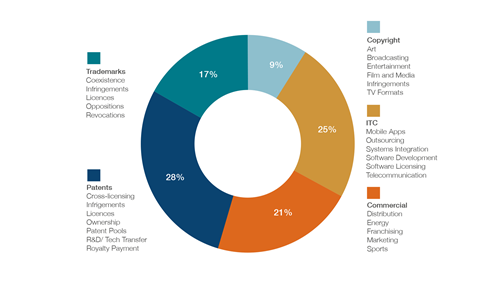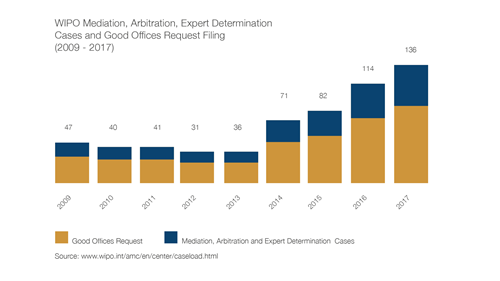18 February 2019
roadmap
austria
IP arbitration on the rise
Intellectual property (IP) is a key factor in today's business world and in society in general – not least through the omnipresent digitalisation of workflows, entire businesses and everyday life. IP-driven transactions, IP asset management and of course disputes over IP are gaining more and more traction. Especially matters involving complex technology issues, particularly those with a multijurisdictional angle, become less suitable for typical IP litigation before national courts. While there is a trend in many countries towards having IP matters decided by specialised IP judges (for example, Austria bundled all first instance IP litigation matters at the Commercial Court Vienna some time ago), matters are gaining complexity, requiring specific in-depth technical expertise, which is not always available "on the bench" but rather outsourced to technical experts.
To meet the particular needs in IP and technology disputes, the World Intellectual Property Organisation (WIPO) established the WIPO Arbitration and Mediation Center (WIPO-Center) and specific arbitration (expedited and non-expedited), mediation and expert determination regimes. Key figures published by the WIPO Center show widespread use of its services in the fields of TMT and IP (WIPO Mediation, Arbitration and Expert Determination Cases) and the number of cases handled by the WIPO Center is consistently growing, showing rising demand for such specialized services:

In a nutshell, the key aspects of the WIPO arbitration regime are:
• WIPO Neutrals: the WIPO Center administers a comprehensive list of experts specialised in various fields acting as arbitrators;
• specific rules on interim injunctions: quick suspension of infringements is often key in IP disputes – thus, the WIPO arbitration regime provides specific focus on interim decisions;
• confidentiality regime: IP and technology arbitration often involves secret know-how and trade secrets; the WIPO Rules provide for a specific set of provisions on dealing with confidential information introduced in arbitration proceedings;
• evidence proceedings: the WIPO Rules provide specific sets of provisions on taking evidence via expert witnesses, including arranging for experiments to be conducted during arbitration.

But: IP disputes and arbitration – how do these fit together? When talking about IP arbitration, two main issues must be considered:
• is an arbitration clause in place? A core element of many IP disputes is the IP owner's right to prevent others from using its IP (cease and desist claim). As a matter of fact, usually there is no contract in place between the rival parties. And even if there is (for instance licence agreements, technology agreements, trademark co-existence agreements or even transaction agreements also containing IP-related issues), such agreements often do not contain IP-specific arbitration clauses or any arbitration clauses at all.
• Is the matter of the dispute arbitrable? In IP disputes, the existence, validity, ownership or scope of certain IP rights are at least preliminary questions to be resolved before the merits of a case can be determined. With regard to registered IP (such as patents, utility models, trademarks or designs), the question of whether such IP right has been lawfully registered by the authorities is typically resolved in front of the national courts and authorities, and not by private arbitrators.
This can lead to a situation where company A, which owns patent registrations in several countries, is faced with a competitor, company B, which is marketing potentially infringing products in several markets. A and B become involved in patent infringement litigation before several national courts in order for A to prevent the sale of the competitor's product and in the end to obtain appropriate damages. This may lead to inconsistent national decisions as to (i) the validity of the very same patent in different countries, (ii) whether or not the competitor product infringes the patent, and (iii) the calculation of damages in each market.
Concerning the arbitrability of disputes about the validity of registered IP rights, as long as the preliminary question could also be subject to a settlement between the parties, it is commonly held that this question should be arbitrable. Of course, the result of such arbitration cannot cause any third-party effect and cannot bind national register authorities to carry out any specific acts as to the registration of the IP rights that were subject to arbitration. But an arbitrator may well decide with inter partes effect whether a patent can be enforced against the defendant or not. However, due to uncertainties in this respect, it is important to check whether such circumstances may render an arbitration award unenforceable under certain national laws.
When drafting IP and technology agreements or even when being confronted with a (multijurisdictional) dispute scenario, parties should consider specialized IP arbitration as a valid alternative to court litigation. Nevertheless, careful thought must be given to whether this option indeed is fit for the intended purpose.
-----
This article was up to date as at the date of going to publishing on 10 December 2018.

Michael
Woller
Partner
austria vienna